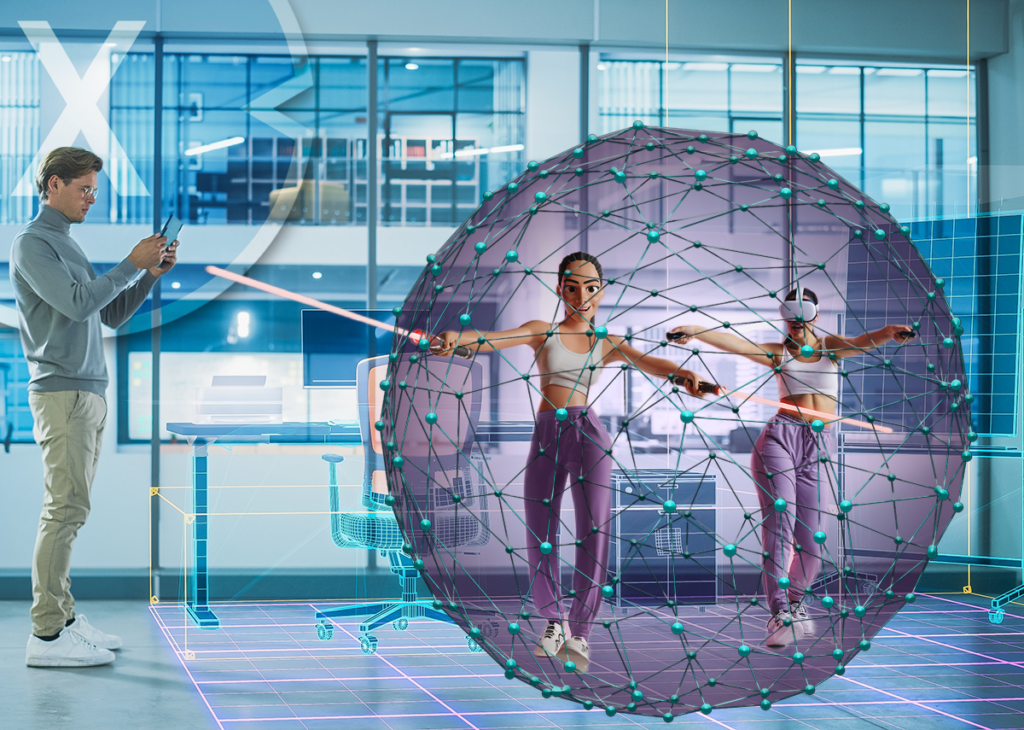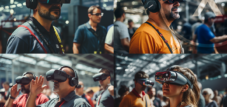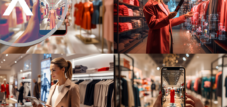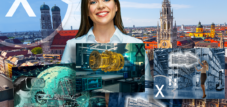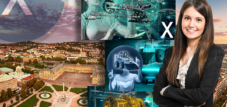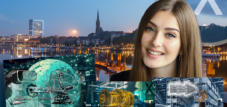Extended Reality: Augmented and Virtual – The Metaverse City Marketing of the Future? 2024 for new concepts and strategies
Language selection 📢
Published on: December 20, 2023 / update from: December 20, 2023 - Author: Konrad Wolfenstein

Extended Reality: Augmented and Virtual - The Metaverse City Marketing for New Concepts and Strategies - Image: Xpert.Digital - AI & XR-3D Rendering Machine (Art Photo/AI)
🔮🌆 Augmented Reality: Augmented and Virtual - Is the Metaverse the city marketing of the future? 🌍🏙️
The terms “augmented reality” (AR) and “Virtual Reality” (VR) have been in our vocabulary for several decades, but only in recent years have the technologies began to establish themselves as sustainable instruments for marketing. With a view to 2024 and beyond, new, innovative paths open up for city marketing, which are characterized by the fusion of the physical with the digital world. In this consideration, we examine the potential of AR and VR in the context of city marketing and explore to what extent the metaverse could play a role in the future of this industry.
City marketing has the task of positioning a city as a brand, making it attractive and interesting for residents as well as visitors and investors. The traditional tools of city marketing include print media, events and trade fairs, but digital revolutions have changed the playing field. AR and VR offer fascinating new opportunities to expand the cityscape and create a deeper, interactive experience.
🔍 Augmented reality in city marketing 📲🌍
Augmented Reality expands the real world with digital information. Information about sights, events or shops can be displayed via a smartphone camera or specialized AR glasses without the user having to take their eyes off their surroundings. This creates an interactive interface between the city and its visitors or residents.
Imagine you stroll through historical streets, and your smartphone or AR glasses not only show you information about historical events that have taken place there, but also lets them dive into a past era-for example by visualizing past buildings or Historical personalities who “pass” past them. With this added value, cities can present their history and culture in an innovative and memorable way.
🌐 Virtual reality as an immersion tool 🎮🌍
Virtual reality, on the other hand, transports users into a completely digital world. This can be particularly useful for city marketing, introducing potential visitors or investors to the city in an immersive way without them having to be physically present. VR can be used for virtual city tours, the staging of planning visions or simulations of future projects.
One application example is the virtual inspection of planned construction projects. Interested citizens, investors or city planners can immerse themselves in a VR environment to experience how a new shopping center or renovated square would fit into the cityscape. The physical conditions can be enriched with data and made accessible for decision-making without the first stone having to be laid.
🌌 The Metaverse as a city marketing platform 🎭🌍
The Metaverse, often understood as a collective virtual shared space created by the convergence of physically persistent virtual spaces and physical space, represents an evolution of virtual and augmented reality. It provides a platform on which users can interact, similar to they do it in the real world.
Cities can establish presences in the metaverse that go far beyond websites or social media profiles. Within the metaverse, cities can create virtual information centers, digital twins of real places or interactive venues. Citizens could participate in public discussions, attend virtual concerts or receive services without leaving their homes.
🔮 Future concepts and strategies 🚀🔮
The Metaverse enables a profoundly new concept for city marketing. It opens doors for a 24/7 interactive and global presence. Future concepts could include:
- Virtual tourist information accessible 24/7.
- Gamified city experiences where users can earn points for visiting attractions.
- Interactive citizen participation platforms for urban development projects.
- Virtual trading floors where local entrepreneurs can offer their products in the digital space.
- Education and training programs that provide historical, cultural or technical knowledge about the city.
🔥 Challenges and opportunities 🧩🚦
Integrating AR, VR and the Metaverse into city marketing is not without challenges. Privacy, accessibility and the digital divide are just some of the issues to consider. Furthermore, implementing such technologies requires investments in both hardware and content development.
But the opportunities outweigh the odds: by using these technologies, cities can increase their own attractiveness and visibility, reach new target groups and offer innovative services. They can involve citizens more and promote participatory processes.
City marketing in 2024 and beyond is not just a question of brochures and posters. It is the creation of an interactive, vibrant and rich experiential landscape in which physical and digital worlds blur together. The urban experience is expanded and redefined.
🌇 The digital twin as the core of digital city marketing 🌆🌍
A “digital twin” of a city is an almost lifelike digital representation of the physical city structures and processes, updated in real time. Such virtual images can be implemented in the Metaverse to develop urban planning simulations, traffic analyzes and energy efficiency models. In addition, they form an interactive basis for city marketing: Users can use such a model to virtually walk through the city, find out about future projects or understand historical changes.
🎭 Immersive cultural and educational experiences 🏛️📚
Cultural institutions such as museums, galleries and theaters can use AR and VR to open up completely new dimensions of experience. Users could fight in historical battles via VR or view works of art in AR that are enriched with interactive elements and information. Educational programs can be made lively and interactive using immersive technologies, so that children and young people, for example, learn in a playful and fun way.
🌱 Sustainability and city marketing ♻️🌍
The aspect of sustainability is also playing a growing role in city marketing. AR and VR can help visualize sustainability initiatives and raise awareness. Cities could offer virtual tours of “green” neighborhoods or depict the effects of climate change in digital scenarios. Such experiences can underline the need for sustainable development and generate support for related projects.
🤝 Collaboration and networking 🌍🤝
Digitalization also enables new forms of collaboration between cities, companies and citizens. In the Metaverse, for example, cities could hold joint virtual trade fairs or networking events to use resources more efficiently and create synergies. The opportunities for collaborations and partnerships are significantly expanded through AR, VR and the Metaverse.
📖 City marketing of the future 🏙️🔍
City marketing of the future will be interactive, immersive and digital. Augmented reality in the form of AR and VR as well as the emerging Metaverse are opening up new horizons for city marketing. Cities that adopt these technologies will increase their attractiveness, interact with their citizens in new ways, and find innovative solutions to urban challenges.
By integrating these technologies, city marketing can create more complex and deeper relationships with city residents and visitors. The virtual world in the Metaverse can provide a platform on which a city's identity with all its social, cultural, historical and economic facets unfolds.
As we approach 2024 and beyond, it is clear that urbanization will continue to advance and cities will become increasingly global, diverse and technologically connected. AR, VR and the Metaverse are more than just buzzwords; they are tools that have the potential to transform the nature of city marketing and create real, sustainable connections between the city and its residents and visitors. In a world where physical and digital experiences are increasingly merging, the ability to create an immersive and engaging environment will become an indispensable part of city marketing and planning.
📣 Similar topics
- 📲🌍 Augmented Reality: The future of interactive city marketing
- 🌐 Virtual reality is revolutionizing city marketing: potential and opportunities
- 🎭 The Metaverse as a new playground for city marketing
- 🚀🔮 Revolutionary concepts for city marketing in 2024
- 🧩🌇 The challenges and opportunities of AR, VR and Metaverse in city marketing
- 🌆🌍 Digital twin: The future of city marketing
- 🏛️📚 AR and VR in art and culture: A new dimension of experience
- ♻️🌍 Sustainability in city marketing: Innovative approaches through AR and VR
- 🌍🤝 Networked city marketing: Digital collaboration between cities and companies
- 🏙️🔍 Future of city marketing: Immersive technologies as the key to success
#️⃣ Hashtags: #Citymarketing #AR #VR #Metaverse #Future
🎯🎯🎯 Benefit from Xpert.Digital's extensive, fivefold expertise in a comprehensive service package | R&D, XR, PR & SEM

AI & XR 3D Rendering Machine: Fivefold expertise from Xpert.Digital in a comprehensive service package, R&D XR, PR & SEM - Image: Xpert.Digital
Xpert.Digital has in-depth knowledge of various industries. This allows us to develop tailor-made strategies that are tailored precisely to the requirements and challenges of your specific market segment. By continually analyzing market trends and following industry developments, we can act with foresight and offer innovative solutions. Through the combination of experience and knowledge, we generate added value and give our customers a decisive competitive advantage.
More about it here:
🏙️ Inclusivity in city marketing
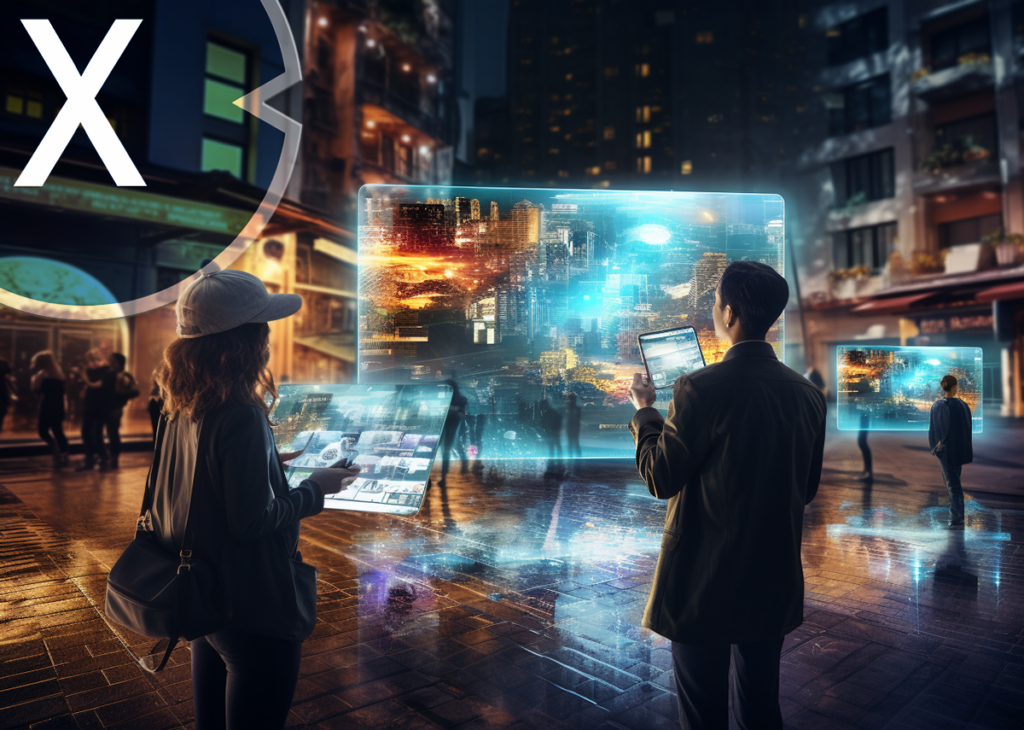
Inclusivity in city marketing with XR technologies (Extended Reality) and Metaverse – Image: Xpert.Digital – AI & XR 3D Rendering Machine (art photo/AI)
🔮🌍 Future prospects in the context of global trends
In this rapidly evolving world, it is important to understand that the Metaverse and its associated technologies are not isolated phenomena. Rather, they are part of a larger change that is characterized by increasing networking and the digitalization of all areas of life. In 2024, cities are expected to be not only places where people live and work, but also interfaces for global digital networks.
🏙️ Inclusivity in city marketing
Digital technologies in city marketing must be designed to be inclusive. This means they must be accessible and usable for people of all ages, social classes and ability levels. Inclusivity also means providing information in multiple languages so that international visitors and new residents can navigate and engage. The role of the Metaverse could be crucial here, providing platforms for real-time translation and accessible user interfaces that enable customization.
📊⚙️ The role of data and AI
Intelligently used data streams and the integration of artificial intelligence (AI) create new opportunities for personalized marketing. For example, machine learning could be used to analyze visitor behavior and make individualized recommendations for attractions or events. AI-supported systems could also help manage urban challenges such as traffic flow and environmental pollution and thus improve the quality of life.
🔒🤔 Safety and ethics
As technology advances, so do the demands for security and ethical considerations. The collection and processing of data in the Metaverse must be accompanied by strict data protection policies to protect user privacy. Ethical design is therefore becoming a central principle for everyone involved in digital city marketing.
🌿🏗️ Sustainable urban development
City marketing in 2024 is likely to be increasingly confronted with the question of sustainable urban development. The use of AR and VR can help not only to represent sustainable concepts, but also to make them tangible. In this way, they help to raise awareness of ecological challenges and actively involve citizens in the urban development process.
🔮🔭 The future of city marketing
The future of city marketing lies in the skillful combination of physical reality and digital expansion. AR, VR and the Metaverse offer an immense spectrum of possibilities to highlight cities as dynamic, interactive and multi-layered places of the digital age. At a time when technological advances are making physical distance increasingly irrelevant, these technologies could help open cities to a global audience and shape them not just as places, but as spaces of experience.
City marketing must see this change as an opportunity and use the instruments of the digital world wisely and creatively to achieve its goals. This requires forward-thinking, investment in education and a willingness to move towards an integrated digital future together with citizens, companies and other stakeholders. If these challenges are accepted, city marketing can make a significant contribution to developing cities as livable, diverse and sustainable places in which digital technologies promote the well-being of the community.
📣 Similar topics
- 🌐 The future of city marketing: The Metaverse as a turning point
- 🏢 Inclusive city marketing in the age of the Metaverse
- 📊 Personalized marketing through data and AI
- 🔒 Security and ethics in digital city marketing
- ♻️ Sustainable urban development with AR and VR
- 🌆 The merged reality: city marketing in the digital age
- ⚡️ Challenges and opportunities of city marketing in the metaverse
- 🌍 Inclusive technologies in city marketing: opportunities and implementation
- 🔍 Data-driven city marketing: potential and risks
- 🏙️ Digitization and shaping the urban future
#️⃣ Hashtags: Future prospects, inclusivity, data and AI, security and ethics, sustainability
🗒️ Xpert.Digital: A pioneer in the field of extended and augmented reality
🏙️ Sustainable engagement strategies
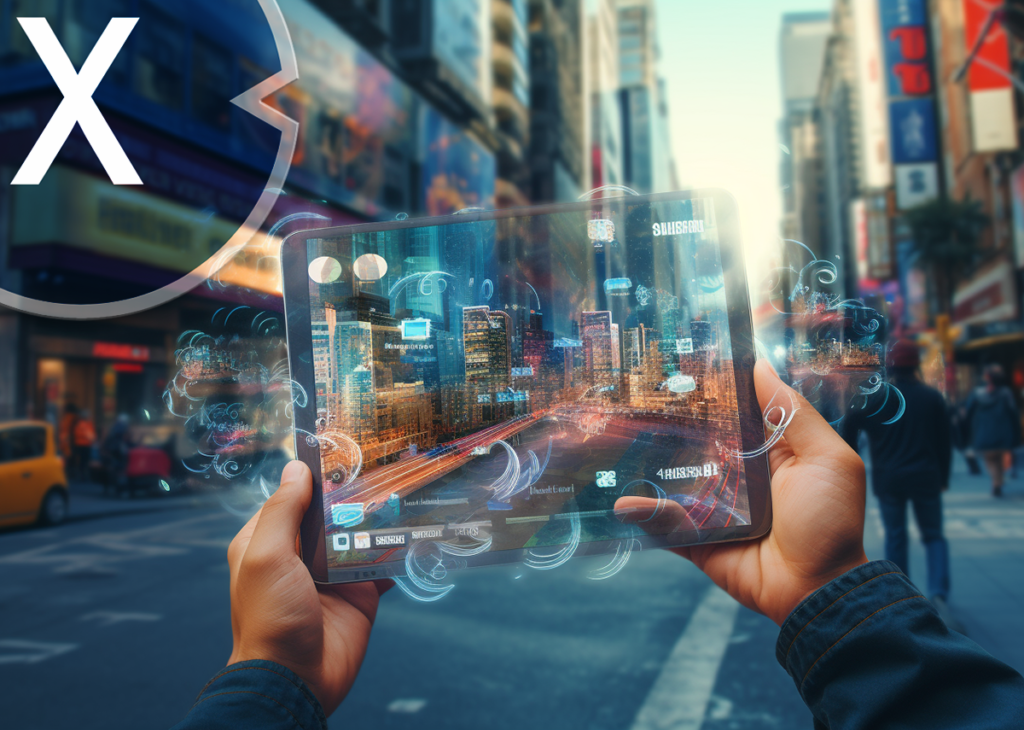
Sustainable engagement strategies for city marketing with augmented reality through the metaverse – Image: Xpert.Digital – AI & XR-3D rendering machine (art photo/AI)
🌍 City marketing will increasingly have to strive for an all-encompassing commitment that goes beyond pure advertising. It's about building long-term relationships with citizens, visitors and entrepreneurs. Through the use of AR, VR and the Metaverse, cities can create unique, experience-based interactions that invite individuals to become part of the city's history, participate in collective actions and shape the development of their surroundings.
📖 Digital storytelling
📚 Digital storytelling is becoming an important tool in city marketing by telling the story of the city and its people. The immersive nature of AR and VR allows such stories to be experienced, promoting a stronger emotional connection to the place. These stories can also be continually expanded in the Metaverse and co-created by users themselves, creating a deeper connection and a feeling of belonging.
🔗 The connection between physical and digital space
🌉 City marketing in the digital age will intertwine physical and digital spaces. This means that the physical experience of a city – be it through architecture, parks or public spaces – is complemented by digital layers that provide additional information, entertainment and ways of interaction. For example, a wall can become an interactive timeline of the city's history using AR, or a park can become the setting for a historical scene using VR.
🤝 Co-creation and citizen participation
🙋♂️ The technologies of the Metaverse offer exciting opportunities for co-creation and citizen participation. Residents 🏠 and visitors 👥 can be actively involved in the design of city marketing campaigns by creating their own content for AR and VR applications or participating in city planning processes in virtual forums. This participatory approach empowers citizens to be not only consumers but also creators of urban life.
💼 Economic implications
💰 Incorporating AR, VR and Metaverse technologies can also have far-reaching economic impacts. It can lead to new tourism, attract innovative business creation and investment, and create new jobs in technological and creative sectors. Cities that invest in these technologies early on can position themselves as leading innovation centers and thus increase their economic attractiveness.
🤔 The challenge of technology acceptance
❗ Despite all the advantages, the acceptance of these technologies is a challenge. Cities must find ways to promote technological education and reduce fear of contact. Through public demonstrations, workshops and access to affordable technology, city marketing can help create a broad user base for AR, VR and Metaverse applications.
🔮 Future scenarios
🔭 If we look into the future, we can imagine scenarios in which every physical interaction in a city is supplemented by digital layers. A tourist could point their smartphone at a building to see its history or use a virtual tour guide that offers a personalized experience. Art installations could exist in both the real world and the metaverse, allowing for different levels of interaction and interpretation. Additionally, urban processes such as town hall meetings and voting could take place in virtual environments, making them more accessible and engaging.
🌇 Identity and experience of a city
🔍 In 2024 and beyond, city marketing plays an essential role in shaping a city's identity and experience in an increasingly digitalized world. The intelligent uses of AR, VR and Metaverse technologies can redefine urban space and transform it into a vibrant, diverse and interactive place of gathering. With the right mix of innovation, creativity, strategic planning and a focus on inclusivity and sustainability, city marketing can not only improve a city's image, but also serve its citizens, promote the common good and advance social and economic development. The fantasy of city planners, marketing strategists and citizens who not only want to live in a city together, but want to experience it is a reality.
📣 Similar topics
- 🏙️ Digital city marketing for the 21st century
- 🌍 The Metaverse as the future of city marketing
- 🎭 AR and VR in the service of city marketing
- 🤝 Co-creation and citizen participation in city marketing
- 💼 Economic opportunities through metaverse technologies
- 🔮 The future of city marketing: Virtual reality ahead
- 🌆 The connection between analog and digital space in city marketing
- 🧠 The challenges of technology acceptance in city marketing
- 👥 Identity and experience: city marketing in the digital age
- 📈 Sustainable city marketing with immersive technologies
#️⃣ Hashtags: #DigitalCityMarketing #Metaverse #ARandVR #CoCreation #EconomicOpportunities #FutureofCityMarketing #AnalogandDigital #TechnologyAcceptance #IdentityandExperience #SustainableCityMarketing
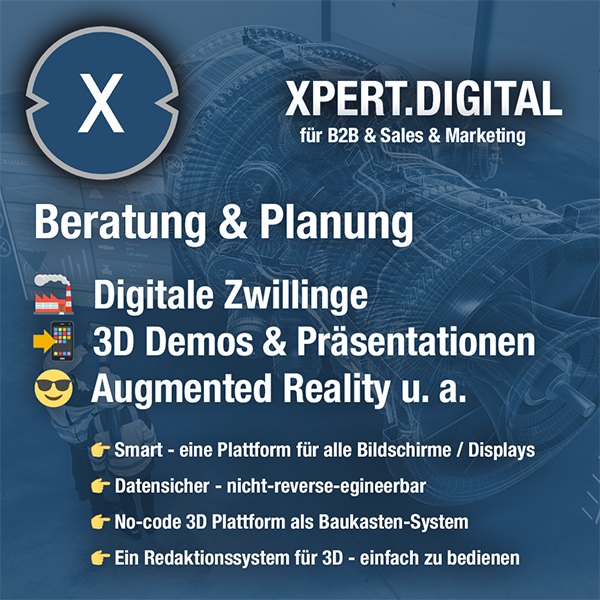
We are there for you - advice - planning - implementation - project management
Xpert.Digital - Pioneer Business Development
Smart Glasses & KI - XR/AR/VR/MR industry expert
Consumer metaverse or meta -verse in general
If you have any questions, further information and advice, please feel free to contact me at any time.
I would be happy to serve as your personal advisor.
You can contact me by filling out the contact form below or simply call me on +49 89 89 674 804 (Munich) .
I'm looking forward to our joint project.
Xpert.Digital - Konrad Wolfenstein
Xpert.Digital is a hub for industry with a focus on digitalization, mechanical engineering, logistics/intralogistics and photovoltaics.
With our 360° business development solution, we support well-known companies from new business to after sales.
Market intelligence, smarketing, marketing automation, content development, PR, mail campaigns, personalized social media and lead nurturing are part of our digital tools.
You can find out more at: www.xpert.digital - www.xpert.solar - www.xpert.plus



